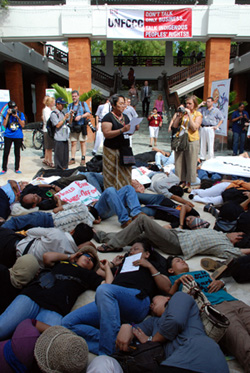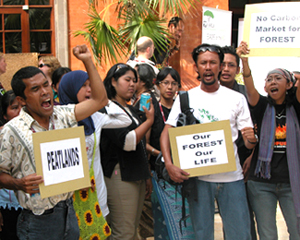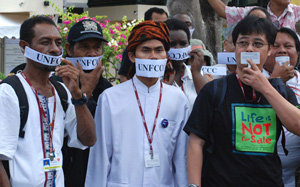
On December 11th, a very diverse group of non-governmental organizations, indigenous peoples organizations and social movements staged a protest outside of a press conference where World Bank President and former US Trade Representative Robert Zoellick announced the launch of the World Bank’s Forest Carbon Partnership Facility.
"This Facility is merely the World Bank up to their old tricks," stated Anne Petermann, Co-Director of Global Justice Ecology Project. "They’ve packaged up their carbon trading agenda under the guise of forest protection, when in fact this Facility will result in more forest destruction, more displacement of indigenous peoples and more carbon emissions. It’s a lose-lose-lose proposition for everyone but big business," she added.
Close to 100 people stood outside of the press conference facility chanting slogans and staging a die-in, with different people representing island nations, indigenous and women’s groups, ecosystems and species that are threatened with annihilation from climate change. They charge that the focus of the World Bank on profit-oriented "false solutions," like carbon trading and carbon offset projects including industrial tree plantations, is actually contributing to an acceleration of climate change.
"While pretending to be concerned about climate change and poverty, The World Bank has continued to fund fossil fuel exploitation to the tune of $8 billion since 2000," explained Janet Redman, a researcher with the Sustainable Energy and Economy Network. "At the same time, they’ve done virtually nothing to bring clean energy to the 1.6 billion people without electricity," she added.

"The World Bank is channeling over $2 billion from the most polluting industries in the industrialized north to the most polluting companies in the global south, while profiting handsomely from so-called ‘overhead,’" added Anna Pinto of the Center for Organizations, Research & Education. "The Forest Carbon Partnership Facility is merely more of the same. It is also violating the rights of indigenous peoples to prior and informed consent as laid out in the UN Declaration on the Rights of Indigenous Peoples," she concluded.
The very vocal and impassioned protest continued for 35 minutes with chants including "World Bank: Hands Off!" "Robert Zoellick You Can’t Hide: Carbon Trading is a Crime," "More Forest: Less Bank!" and "Land Rights Now!"
Titi Soentoro, of the Indonesian Civil Society Forum and the Gender Caucus read a statement endorsed by dozens of groups demanding the rejection of the World Bank’s Forest Carbon Partnership Facility.
Contacts: Janet Redman, SEEN, +62-817-477-9143
Simone Lovera, Global Forest Coalition, +62-813-379-84-639
Indigenous Peoples Protest Climate Change Negotiations at UN Climate Convention
On December 7th, indigenous peoples representing regions from around the world protested outside the climate negotiations wearing symbolic gags that read UNFCCC, the acronym of the United Nations Framework Convention on Climate Change, symbolizing their systematic exclusion from the UN meeting.
Yesterday a delegation of indigenous peoples was forcibly barred from entering the meeting between UNFCCC Executive Secretary Yvo de Boer and civil society representatives, despite the fact that the indigenous delegation was invited to attend. This act is representative of the systematic exclusion of indigenous peoples in the UNFCCC process.

"There is no seat or name plate for indigenous peoples in the plenary, nor for the United Nations Permanent Forum on Indigenous Issues, the highest level body in the United Nations that addresses indigenous peoples rights," stated Hubertus Samangun, the Focal Point of the Indigenous Peoples delegation to the UNFCCC and the Focal Point for English Speaking Indigenous Peoples of the Global Forest Coalition.
"Indigenous peoples are not only marginalized from the discussion, but there is virtually no mention of indigenous peoples in the more that 5 million words of UNFCCC documents," argued Alfred Ilenre of the Edo People of Nigeria.
This is occurring despite the fact that indigenous peoples are suffering the most from climate change and climate change mitigation projects that directly impact their lands.
Indigenous peoples are here in Bali to denounce the false solutions to climate change proposed by the United Nations such as carbon trading, agrofuels and so-called "avoided deforestation" that devastate their lands and cause human rights violations.
"This process has become nothing but developed countries avoiding their responsibilities to cut emissions and pushing the responsibility onto developing countries," stated Fiu Mata’ese Elisara-Laula, of the O Le Siosiomaga Society of Samoa. "Projects like REDD (Reducing Emissions from Deforestation in Developing countries) sound very nice but they are trashing our indigenous lands. People are being relocated and even killed; my own people will soon be under water. That’s why I call the money from the projects blood money," he added.
Marcial Arias of the Kuna People of Panama reminded the international community that indigenous peoples’ right to participate was recognized in the Earth Summit in 1992 and reaffirmed this year. "On September 13th of this year, the United Nations General Assembly adopted the UN Declaration on the Rights of Indigenous Peoples [1] which enshrines the fundamental human rights of indigenous peoples to their lands, territories and environment. It is precisely these rights recognized by the UN itself that the UNFCCC is violating," he explained.
Contact: Hubertus Samangun, Indigenous Focal Point to the UNFCCC (Bahasa, English) +62 813-1077-8918
Orin Langelle, Global Forest Coalition Media Coordinator +62 813-3895-9742 (English)
Notes:
[1] http://www.un.org/esa/socdev/unpfii/en/declaration.html
For more information, visit The Global Justice Ecology Project
The STOP Genetically Engineered Trees Campaign is a Program of Global Justice Ecology Project http://www.stopgetrees.org
Global Justice Ecology Project is the North American Focal Point for Global Forest Coalition http://www.globalforestcoaliti
Global Justice Ecology Project Mission Statement: Building local, national and international alliances with action to address the root causes of social injustice, economic domination and environmental
destruction.
